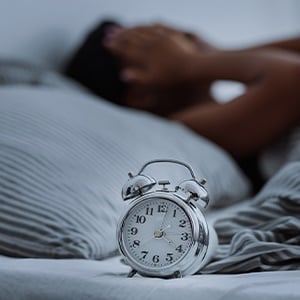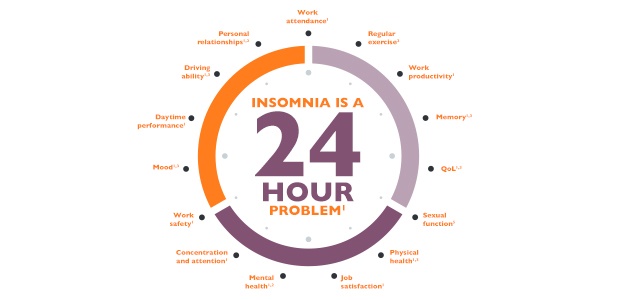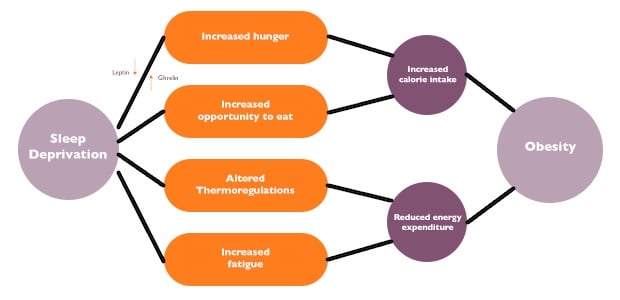
What is insomnia?
It is the inability to fall asleep, stay asleep or waking up too early. It is a common condition that affects more than a third of adults and it’s closely linked to a decrease in a quality of life.1,2
The 24-hour problem
Insomnia doesn’t just affect your sleep experience, it also has a negative impact on your daytime functioning and activities, so it’s considered a 24-hour problem.1 Lack of good quality sleep can lead to many short- and long-term complications like daytime fatigue, poor concentration, poor mood, decreased driving ability, decreased work performance, diabetes, hypertension, heart disease, anxiety and depression.1-6
* Increased risk of anxiety and depression
** Increased risk of hypertension, diabetes, cardiovascular diseases
Insomnia and ageing7,8,9
As you age, especially once you’re over 50, the risk of insomnia increases. This increase is thought to be due to an age-related decrease in melatonin secretion. Melatonin is a hormone secreted by the brain during the night that helps regulate your daily sleep-wake cycle. Not only does ageing, increase your risk for developing insomnia, but chronic poor quality sleep actually increases signs of intrinsic ageing i.e. your skin’s appearance and its barrier function.
Insomnia and your weight10,11,12
Did you know that people who sleep less are on average heavier? Studies have shown that decreased sleep duration and quality is associated with increased body weight and obesity. This is thought to occur through the impact of sleep on specific hormones in the body. A chronic lack of sleep leads to an increased level of the stress hormone, cortisol, which increases cravings for high fat and high sugar foods as well as increasing the storage of fat in the tummy area. Habitual poor sleep also results in decreased leptin levels and increased ghrelin levels, which causes an increased appetite and overeating. Shortened sleep time may also simply mean an increased opportunity to eat, especially if this wake-time is spent snacking in front of the TV. Poor sleep also results in daytime fatigue, which negatively impacts your desire or ability to exercise and hence decreases your energy output – it’s a vicious circle. Studies have also found that sleep deprivation in humans results in a lower core body temperature, which suggests that sleep loss may impact energy output through thermoregulation. Ultimately, all of these factors work together to increase your body weight and put you at risk for developing obesity.
Insomnia and your immune system13,14,15
Since ancient times, people have believed that sleep loss can lead to illness, and research over the past 20 years has provided strong evidence in support of the popular wisdom that ‘sleep helps healing’. Animal and human studies have shown that prolonged periods of sleep loss and even modest disturbances of sleep can lead to increased stress and inflammation in the body and a suppressed immune system. This in turn can make you more susceptible to infections like colds and flu.
Insomnia and your heart16,17,18
It’s hard to believe that sleeping 6 or less hours per night, especially if the sleep you are getting is of poor quality, could increase your risk of having a heart attack or stroke. But that is exactly the case. Short sleep duration has a negative impact on your body weight, blood pressure, blood lipids and diabetes risk, all of which increase your risk for cardiovascular diseases like heart attacks and strokes. Not only that but you also have an increased risk of developing high blood pressure and heart failure if you are an insomnia sufferer. So you should take not sleeping well to heart and seek help.
Leptin = hormone secreted by your fat cells that suppresses your appetite
Ghrelin = hormone secreted by your stomach that stimulates your appetite
For more information on insomnia visit www.sleepless.co.za and download your free sleep diary.
Ask your doctor about the only registered melatonin tablet in South Africa.
References:
1. Wilson SJ, Nutt DJ, Alford C, Argyropoulos SV, Baldwin DS, Bateson AN, et al. British Association for Psychopharmacology concensus statement on evidence-based treatment of insomnia, parasomnias and circadian rhythm disorders. J Psychopharmacol 2010;24(11):1577-1600.
2. Mental Health Foundation. Sleep Matters: The impact of sleep on health and wellbeing. Mental Health Awareness Week 2011. [Online] 2011 [cited 2015 Aug 7. Available from: URL: http://www.mentalhealth.org.uk/content/assets/PDF/publications/MHF-Sleep-Report-2011.pdf?.
3. Zisapel N. Sleep and sleep disturbances: biological basis and clinical implications. Cell Mol Life Sci 2007;64:1174-1186.
4. Walsh JK. Clinical and Socioeconomic Correlates of Insomnia. J Clin Psychiatr 2004;65(Suppl 8): 13-19.
5. Holka-Pokorska J, Jarema M, Wichnia A. Androgens - a common biological marker of sleep disorders and selected sexual dysfunction? Psychiatr Pol 2014; 48(4):701-714.
6. Scott BA, Judge TA. Insomnia, Emotions, and Job Satisfaction: A Multilevel Study. J Management 2006;32(5):622-645.
7. Weyerer S, Dilling H. Prevalence and Treatment of Insomnia in the Community: Results from the Upper Bavarian Field Study. Sleep 1991;14(5):392-398.
8. Zisapel N. Melatonin and Sleep. Open Neuroendocrinol J 2010;3:85-95
9. Oyetakin-White P, Suggs A, Matsui MS, Yarosh D, Cooper KD, Baron ED. Does poor sleep quality affect skin ageing? Clin Exp Dermatol 2015;40(1):17-22.
10. Hargens TA, Kaleth AS, Edwards ES, Buner KL. Association between sleep disorders, obesity, and exercise: a review. Nat Sci Sleep 2013;5:27-35.
11. Taheri S, Lin L, Austin D, Young T, Mignot E. Short Sleep Duration Is Associated with Reduced Leptin, Elevated Ghrelin, and Increased Body Mass Index. PLos Med 2004;4(3):e62.
12. Patel SR, Hu FB. Short sleep duration and weight gain: a systematic review. Obesity 2008;16(3):643-653.
13. Savard J, Laroche L, Simard S, Ivers H, Morin CM. Chronic Insomnia and Immune Functioning. Psychosomat Med 2013;65:211-221.
14. Besedovsky L, Lange T, Born J. Sleep and immune function. Pflugers Arch Eur J Physiol 2012;463:121-137.
15. Irwin M, Mcclintick J, Costlow C, Fortner M, White J, Gillin JC. Partial night sleep deprivation reduces natural killer and cellular immune responses in humans. FASEB J 1996;10:643-653.
16. Hoevenaar-Blom MP, Spijkerman AMW, van den Berg JF, Verschuren WMM. Sleep Duration and Sleep Quality in Relation to 12-Year Cardiovascular Disease Incidence: The MORGEN Study. Sleep 2011;34(11):1487-1492.
17. Laugsand LE, Strand LB, Platou C, Vatten LJ, Janszky I. Insomnia and the risk of incident heart failure: a population study. Eur Heart J 2013. DOI: http://dx.doi.org/10.1093/eurheartj/eht019
18. Bansil P, Kuklina EV, Merritt RK, Yoon PK. Associations Between Sleep Disorders, Sleep Duration, Quality of Sleep, and Hypertension: Results From the National Health and Nutrition Examination Survey, 2005 to 2008. J Clin Hypertens 2011;13:739-743.
Litha Pharma (Pty) Ltd. Reg. No.: 1994/008717/07. 106 16th Rd, Midrand. Tel: 087 742 -1860. www.acino.co.za. LP3248 09/2020
This post and content is sponsored, written and provided by Acino.




 Publications
Publications
 Partners
Partners

















